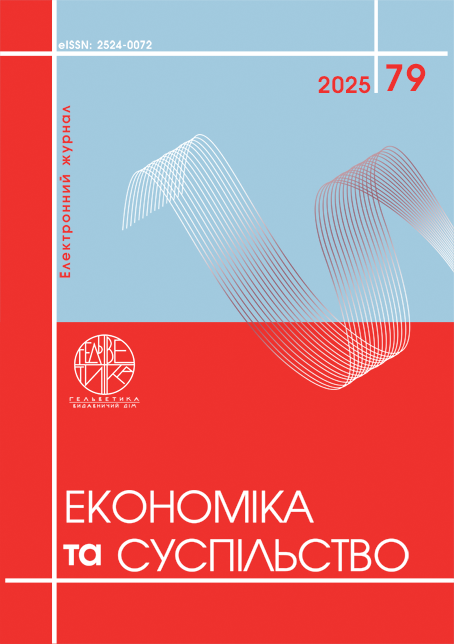FISCAL RESILIENCE AND ADAPTATION OF MUNICIPAL FINANCES DURING THE WAR: AN ANALYSIS OF LVIV AND KHARKIV
Abstract
The article examines the transformation of Ukraine’s local budget system under the conditions of full-scale war, focusing on its financial resilience as a determinant of territorial community sustainability. The study argues that hostilities have triggered deep structural changes in the national fiscal architecture, testing the effectiveness of decentralization reform and revealing asymmetries in the financial capacity of municipalities. Local budgets, which traditionally ensured socio-economic development, have acquired new functions related to defense financing, humanitarian support, and assistance to internally displaced persons. Using the comparative cases of Lviv (rear city) and Kharkiv (frontline city), the research investigates how security risks, economic disruptions, and demographic shifts affect revenue dynamics, expenditure priorities, and overall fiscal adaptability. The methodological framework combines comparative, statistical, graphic, and elements of econometric analysis based on official data from the Ministry of Finance, the State Treasury Service, and the financial reports of both municipalities. The study identifies two distinct models of fiscal resilience: the survival model, represented by Kharkiv, where local finance concentrates on essential services and immediate recovery, and the adaptive model, exemplified by Lviv, characterized by flexible redistribution of resources and proactive socio-economic stabilization. The research concludes that wartime fiscal resilience depends not only on resource volume but also on managerial adaptability, financial autonomy, and intermunicipal coordination. Strengthening fiscal decentralization, enhancing budget transparency, and developing adaptive models of local financial management are key prerequisites for post-war recovery and sustainable territorial development. The findings contribute to the broader discourse on crisis governance and demonstrate how local fiscal systems can serve as both stabilizing and transformative mechanisms amid complex national emergencies.
References
Кириленко, О. (2022). Фінансова самодостатність територіальних громад: сутність та умови забезпечення. Світ фінансів, (4), 68–80.
Куніцин, О. М. (2025). Теоретичні підходи до визначення фінансової стійкості територіальних громад. Успіхи і досягнення у науці, 4(14), 270–280. URL: https://doi.org/10.52058/3041-1254-2025-4(14)-270-280.
Folke, C. (2016). Resilience (Republished). Ecology and Society, 21, 44. DOI: https://doi.org/10.5751/ES-09088-210444.
Nelson, D. R., Adger, W. N., & Brown, K. (2007). Adaptation to environmental change: Contributions of a resilience framework. Annual Review of Environment and Resources, 32, 395–419. DOI: http://dx.doi.org/10.1146/annurev.energy.32.051807.090348.
Linnenluecke, M. K. (2017). Resilience in business and management research: A review of influential publications and a research agenda. International Journal of Management Review, 19, 4–30. DOI: 10.1111/ijmr.12076.
Voznyak, H., Panukhnyk, O., Khymych, H., & Popadynets, N. (2019). Development of regional economic systems under the impact of financial decentralization: display, challenges and new opportunities. Advances in Economics, Business and Management Research. Proceedings of the 7th International Conference on Modeling, Development and Strategic Management of Economic System (MDSMES 2019), 121–126. DOI: https://doi.org/10.2991/mdsmes-19.2019.24.
Лютий, І., & Спасів, Н. (2019). Оцінка фінансової спроможності об’єднаних територіальних громад. Фінанси України, (7), 92–112.
Kyrylenko, O. (2022). Finansova samodostatnist terytorialnykh hromad: sutnist ta umovy zabezpechennia [Financial self-sufficiency of territorial communities: essence and conditions for ensuring]. Svit finansiv – World of Finance, (4), 68–80. (in Ukrainian)
Kunitsyn, O. M. (2025). Teoretychni pidkhody do vyznachennia finansovoi stiikosti terytorialnykh hromad [Theoretical approaches to defining the financial resilience of territorial communities]. Uspikhy i dosiahnennia u nautsi – Advances and Achievements in Science, 4(14), 270–280. https://doi.org/10.52058/3041-1254-2025-4(14)-270-280. (in Ukrainian)
Folke, C. (2016). Resilience (Republished). Ecology and Society, 21, 44. https://doi.org/10.5751/ES-09088-210444.
Nelson, D. R., Adger, W. N., & Brown, K. (2007). Adaptation to environmental change: Contributions of a resilience framework. Annual Review of Environment and Resources, 32, 395–419. http://dx.doi.org/10.1146/annurev.energy.32.051807.090348.
Linnenluecke, M. K. (2017). Resilience in business and management research: A review of influential publications and a research agenda. International Journal of Management Review, 19, 4–30. https://doi.org/10.1111/ijmr.12076.
Voznyak, H., Panukhnyk, O., Khymych, H., & Popadynets, N. (2019). Development of regional economic systems under the impact of financial decentralization: display, challenges and new opportunities. Advances in Economics, Business and Management Research. Proceedings of the 7th International Conference on Modeling, Development and Strategic Management of Economic System (MDSMES 2019), 121–126. https://doi.org/10.2991/mdsmes-19.2019.24.
Liutyi, I., & Spasiv, N. (2019). Otsinka finansovoi spromozhnosti obiednanykh terytorialnykh hromad [Assessment of the financial capacity of amalgamated territorial communities]. Finansy Ukrainy – Finance of Ukraine, (7), 92–112. (in Ukrainian)

This work is licensed under a Creative Commons Attribution 4.0 International License.


